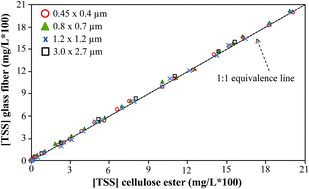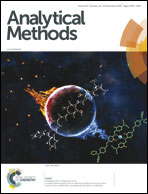The effect of filter type and porosity on total suspended sediment determinations†
Abstract
Most methods for determining total suspended solids (TSS) in water are gravimetric, with sediment collection via filtration through glass fiber filters or cellulose ester membranes. Filters of both types with pore sizes ranging from 0.4 to 1.2 μm have been used in earlier studies to assess TSS concentrations. It is not clear whether results obtained with these different types of filters with distinct pore sizes are comparable. We aim to compare TSS results obtained with cellulose ester membranes and glass fiber filters with effective pore sizes ranging from 0.4 to 3 μm. Water samples collected in different aquatic environments in the Amazon River system and dilutions of Amazon floodplain sediments in distilled water (from 100 to 20 000 mg L−1) were analyzed for TSS. Paired TSS values obtained with cellulose ester membranes and glass fiber filters of similar porosities were highly correlated. The slope regression lines obtained with these paired results for specific porosities were close to one indicating that both types of filters yielded similar results. Regardless of the type of filter, the different porosities (from 0.4 to 3.0 μm) resulted in similar TSS concentrations. We conclude that the range of filter types and porosities considered here are suitable for TSS determinations and the results obtained with them should be comparable between studies. This conclusion supports comparisons of future results with previously obtained TSS information with the above mentioned filter types. It also serves as a guide for choosing the appropriate filter in future environmental studies.



 Please wait while we load your content...
Please wait while we load your content...